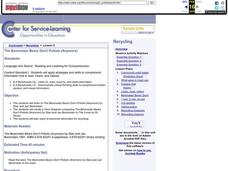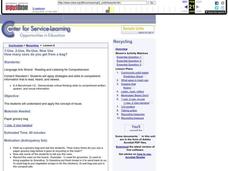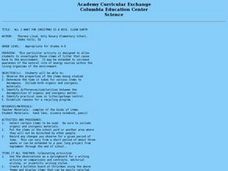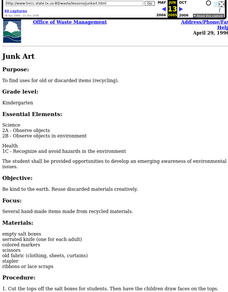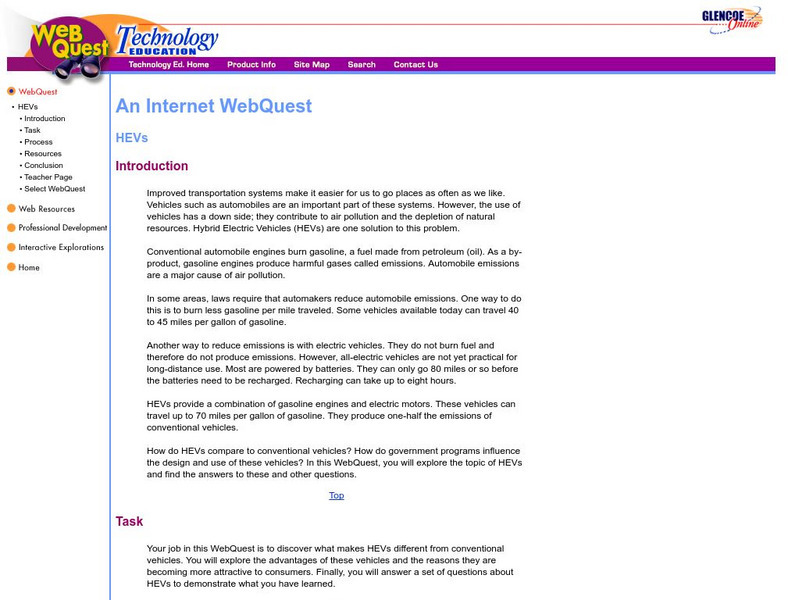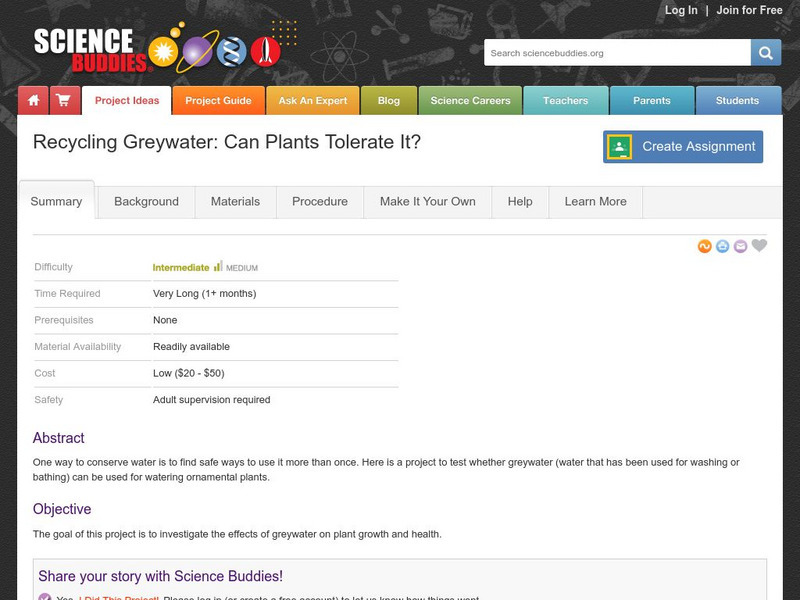Curated OER
Mapping the Village
Learners measure, weigh, and document the amount of trash and garbage generated by the school for one day. They brainstorm solutions for trash in the area and assist with the school-wide recycle program.
Curated OER
The Lorax
Students listen to the story, The Lorax, and discuss the concept of being a spokesperson. They reflect on the concept of recycling and the importance of it in regards to our environment.
Curated OER
The Berenstain Bears Don't Pollute (Anymore)
Students listen to the story, The Berenstain Bears Don't Pollute (Anymore). They create a Venn Diagram comparing it with the story, The Lorax. Then students plan ways to become advocates for recycling.
Curated OER
1-Use, 2-Use, Re-Use, New Use
Learners list the possible uses of grocery bags. They trace the steps of a grocery bag either to recycle or trash. In groups, students use the grocery bags to create posters promoting reuse.
Curated OER
3-D Posters
Students work in small groups to create 3-D posters to discourage throwing trash away and encourage recycling.
Curated OER
Color It Recycled!
Pupils melt old crayon stubs and mold them into interesting shapes and characters. They can add paper clips to created hanging ornaments!
Curated OER
Trash or Treasure?
Pupils discover why, how, and where they should recycle or reuse what they throw away.
Curated OER
All I Want for Christmas is a Nice, Clean Earth
Students observe properties of items, determine time it takes for organic/inorganic items to decompose, identify differences/similarities between decomposition, identify practical uses in litter/garbage control, & establish reasons...
Curated OER
Solid Waste/Recycling
Learners see that when we throw away garbage, it usually ends up in a landfill. Landfill space is getting increasingly scarce, and every time we throw something away we throw with it the energy, the money, and the raw materials it took...
Curated OER
Engineering Solutions
Students use internet resources to explore the side effects of technology; to design, implement and evaluate solutions related to the problem of waste disposal.
Curated OER
Recycling Relay
Students improve their locomotor skills and their knowledge of recycling. They participate in a relay as they recycle different objects into their proper containers.
Curated OER
Separation Before Plastic Recycling
Students participate in a demonstration to test the different densities of plastics, and suggest a method that plastic waste can be separated and collected.
Curated OER
Household Hazardous Waste Identification
Fourth graders learn about reduce, reuse, and recycle and identify household hazardous products. Students learn about less hazardous alternatives and complete an inventory of hazardous materials in a typical household.
Curated OER
Why Recycle?
Learners use Internet Research to list at least 10 ways to recycle resources at home, school and work. They divide into groups, pool their knowledge and prepare infomercials explaining their recycling strategies.
BBC
Bbc: Climate Change
Play this online game to see if you can persuade European nations to reduce their carbon emissions to help our global climate. You are the president, "the future is in your hands!" Archived.
McGraw Hill
Glencoe Technology Education: Hybrid Electric Vehicles (He Vs)
What is an HEV and how can they help the environment? Follow this WebQuest and you will be able to answer those questions and more.
eSchool Today
E School Today: Your Cool Basics on Natural Resources
Looks at the two categories of natural resources, what they are used for, their distribution around the world, threats to natural resources, recycling and composting, and conservation.
Environmental Education for Kids
Eek!: Teacher Resources: My Ton of Trash (Lesson Plan)
Here you can find an engaging lesson plan on the trash each individual generates over time. Students will learn how trash is generated, how trash is disposed of, and possible ways to reduce the amount of trash.
Science Buddies
Science Buddies: The Big Dig
Even though many cities have recycling programs, a lot of trash still ends up in the dump. Find out which materials will break down and which materials won't. Will the results of this experiment change which products you often buy?
Science Buddies
Science Buddies: Alternative Sources for Paper Fiber
If you're interested in arts and crafts, you might like this project. It uses several alternative, renewable sources of fiber to make paper, and compares the resulting papers for strength and writing quality.
Science Buddies
Science Buddies: Recycling Greywater: Can Plants Tolerate It?
Water is a valuable resource many often take for granted. This exercise however gives you the opportunity to learn about and discover how greywater (water that has been used for washing or bathing) can be used for watering ornamental...
Science Buddies
Science Buddies: Waste Not, Want Not: Use the Microbial Fuel Cell to Create Elec
Gross. What is that in the toilet? But maybe it's not just gross. Did you know there are bacteria that digest organic waste and create electrons? What if there was a way to collect those electrons to power a circuit? In this science fair...


